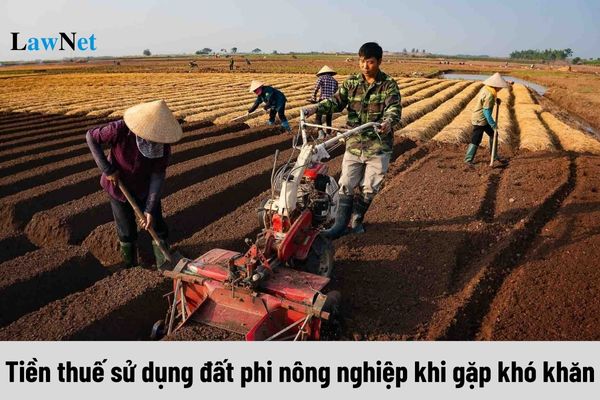Shall taxpayers who face difficulties due to force majeure circumstances be eligible for 50% reduction in non-agricultural land use tax payable in Vietnam?
Shall taxpayers who face difficulties due to force majeure circumstances be eligible for 50% reduction in non-agricultural land use tax payable in Vietnam?
Based on Article 11 of the 2010 Law on Non-Agricultural Land Use Tax, the following provisions apply:
Tax Reduction
A 50% reduction in the payable tax amount is applicable in the following cases:
1. Land used for investment projects in preferential investment sectors; investment projects in areas with difficult socio-economic conditions; land owned by businesses employing 20% to 50% of their workforce as war invalids and sick soldiers.
The list of incentive investment sectors, specially incentivized investment sectors, areas with difficult socio-economic conditions, and areas with exceptionally difficult socio-economic conditions is determined by the provisions of investment law.
The workforce being war invalids and sick soldiers must be regular annual workers as stipulated in Circular No. 40/2009/TT-LDTBXH dated December 3, 2009, from the Ministry of Labor, Invalids and Social Affairs and its amended and supplemental documents.
2. Residential land within the quota in areas with difficult socio-economic conditions.
3. Residential land within the quota for war invalids classified as 3/4, 4/4; beneficiaries of policies equivalent to war invalids classified as 3/4, 4/4; sick soldiers classified as 2/3, 3/3; children of martyrs not receiving monthly allowance.
4. Taxpayers facing difficulties due to force majeure events if the value of land damage and housing on the land ranges from 20% to 50% of the taxable value.
In this case, the taxpayer must have confirmation from the People's Committee at the commune level where the damage occurred.
Thus, taxpayers experiencing difficulties due to force majeure events with a damage value of land and housing on the land ranging from 20% to 50% of the taxable value qualify for the tax reduction.

Shall taxpayers who face difficulties due to force majeure circumstances be eligible for 50% reduction in non-agricultural land use tax payable in Vietnam? (Image from the Internet)
How shall a taxpayer who has more than one residential land plot register, declare, calculate, and pay tax in Vietnam?
Based on Article 8 of the 2010 Law on Non-Agricultural Land Use Tax, the following provisions apply:
Registration, Declaration, Calculation, and Payment of Tax
1. Taxpayers shall register, declare, calculate, and pay tax following the legal provisions on tax management.
2. Taxpayers shall register, declare, calculate, and pay tax at the district, district-level town, provincial city tax office where the land use rights exist.
In remote areas with difficult access conditions, taxpayers may register, declare, calculate, and pay tax at the commune-level People's Committee. Tax authorities shall facilitate taxpayers to fulfill their obligations.
3. If the taxpayer has rights to multiple residential parcels, the taxable area is the total area of all taxable parcels within the provincial or municipal boundary. Registration, declaration, calculation, and payment of tax are stipulated as follows:
a) The taxpayer registers, declares, calculates, and pays tax at the district, district-level town, provincial city tax office where the land use rights are located;
b) The taxpayer may select a homestead land quota in one district, district-level town, provincial city where they have land use rights. If there are one or more parcels exceeding the quota, the taxpayer may select a location with parcels exceeding the quota to determine the excess land area of the parcels.
The taxable price is applied according to the land price of each district, district-level town, provincial city where the parcels are located.
The taxpayer prepares a consolidated declaration according to the prescribed form to determine the total area of parcels they have right of use and the tax already paid, and submits it to the selected tax authority to determine the homestead land quota for paying the difference between the payable tax under this Law and the tax already paid.
In the case where the taxpayer has rights to multiple residential parcels, the taxable area is the total area of all taxable parcels within the province or municipality. Registration, declaration, calculation, and tax payment are specified in section 3 mentioned above.
Is non-agricultural land use tax exempt for homestead land within the quota in Vietnam?
Based on Article 9 of the 2010 Law on Non-Agricultural Land Use Tax, the following provisions apply:
Tax Exemption
1. Land used for investment projects in specially incentivized investment sectors; investment projects in areas with exceptionally difficult socio-economic conditions; investment projects in incentivized investment sectors in areas with difficult socio-economic conditions; land owned by businesses employing over 50% of their workforce as war invalids and sick soldiers.
2. Land used by facilities undertaking private investment in activities related to education, vocational training, healthcare, culture, sports, or environment.
3. Land for constructing homes for social welfare, solidarity housing, homes for old and lonely individuals, the disabled, orphans; social disease treatment facilities.
4. Residential land within the quota in areas with exceptionally difficult socio-economic conditions.
5. Residential land within the quota for revolutionaries active before August 19, 1945; war invalids classified as 1/4, 2/4; beneficiaries receiving policies similar to war invalids classified as 1/4, 2/4; sick soldiers classified as 1/3; national defense heroes; Heroic Mother of Vietnam; biological parents, adoptive parents, guardian of martyrs when young; spouses of martyrs; children of martyrs receiving monthly allowance; revolutionaries affected by Agent Orange; individuals affected by Agent Orange facing difficult family conditions.
6. Residential land within the quota of poor households as defined by the Government of Vietnam.
Thus, for homestead land within the quota, tax exemption is not automatically granted but must be considered for specific subjects. Examples include residential land within the quota in areas with exceptionally difficult socio-economic conditions; and residential land within the quota of poor households as defined by the Government of Vietnam as per the above provisions.

